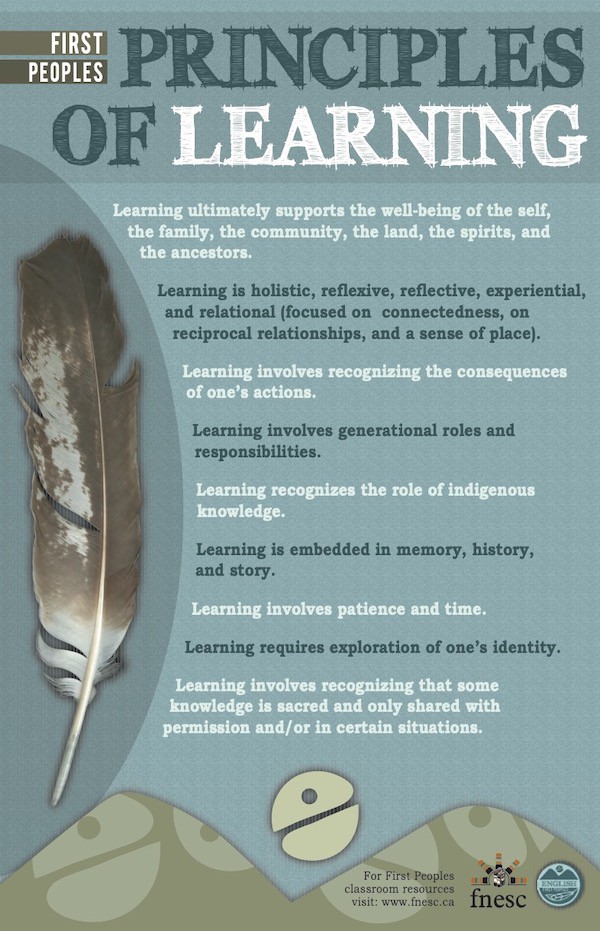First Peoples Principles of Learning
The interconnections between the Principles, Solution Focus and Sustainability
Aug 28, 2024
Synopsis
In this Open Space session, the group explored the British Columbia First Nations Principles of Learning to discover just how deeply intertwined they are with the Solution Focus (SF) approach and our efforts to create a more sustainable world. These Principles are shown below:
Exploring the Principles
Here we explore the Principles in more depth from two perspectives - sustainability and Solution Focus. We also suggest example questions the SF practitioner might ask.
Learning ultimately supports the well-being of the self, the family, the community, the land, the spirits, and the ancestors.
Sustainable perspective: By emphasising the well-being of self, family, community, land, spirits, and ancestors, learning fosters a multi-dimensional perspective that values not just economic growth but environmental stewardship and social welfare. This holistic view encourages practices that benefit all aspects of life and supports sustainable development goals, including social equity, economic stability, and environmental preservation.
SF perspective: SF emphasises the importance of seeing individuals in the context of their relationships and environments, aligning with the principle that learning is holistic, reflexive, reflective, experiential, and relational. This view reflects the SF belief that solutions are found through individual effort and within a network of relationships and community contexts.
SF challenge: How can we broaden the context we explore with our clients? Can we explore more multi-generational questions?
Learning is holistic, reflexive, reflective, experiential, and relational (focused on connectedness, reciprocal relationships, and a sense of place).
Sustainable perspective: Learning that is holistic, reflexive, reflective, experiential, and relational places a strong emphasis on connectedness and reciprocal relationships. This approach nurtures a sense of belonging and responsibility towards one’s community and environment, fostering sustainable behaviors that consider the impacts of actions on current and future generations.
SF perspective: This reflects the SF belief that solutions are found not just through individual effort but within a network of relationships and community contexts.
SF challenge: How can we continue refining our interconnected way of exploring interactions and what happens between the noses?
Example:
- Q: What is different?
- A: ”My colleague calls me when he has a question.”
- Q: How does he start the call?
- A: “He connects with me in a friendly way.”
- Q: And how do you respond?
- A: “With an enthusiastic, ‘Hello, so happy you called!’”
- Q: And how does your colleague respond to your enthusiasm?
- A: “He probably feels a little surprised and says something like: “Yes, I have a few questions regarding the project. Do you have any time for me?” -
- Q: And you say?…
Learning involves recognising the consequences of one’s actions.
Sustainable perspective: Recognising the consequences of one’s actions is fundamental to sustainability. This principle teaches that each decision can have far-reaching effects on the environment and society, thus encouraging more thoughtful and responsible choices that aim to minimise negative impacts.
SF perspective: SF practices focus on the future implications of present actions, similar to the principle that learning involves recognising the consequences of one’s actions.
SF challenge: How can we explore ‘preferred futures’ or use scaling questions to assess the potential outcomes of different choices?
Learning involves generational roles and responsibilities.
Sustainable perspective: Understanding generational roles and responsibilities helps to pass on traditional knowledge and sustainable practices. This understanding ensures that each generation contributes to the conservation and improvement of resources, preserving them for future use.
SF perspective: Solution Focus (SF) involves generational roles and responsibilities by acknowledging different generations’ unique contributions and insights to problem-solving contexts. By doing so, SF supports the transmission of knowledge and roles across generations, ensuring that interventions are relevant and grounded in the lived experiences of all participants.
SF challenge: How do we weave our learning into our experience? How do we tap into our generational wisdom to create better futures?
Learning recognises the role of indigenous knowledge.
Sustainable perspective: Indigenous knowledge systems often encompass sustainable practices honed over centuries and tailored to local environments and communities. Recognising the role of this knowledge not only helps preserve biodiversity and cultural diversity but also allows us to learn from proven sustainable practices.
SF perspective: SF recognises the value of diverse perspectives and knowledge systems, which correlates with the principles acknowledging the role of indigenous knowledge and generational roles. This recognition is particularly relevant in contexts where traditional knowledge systems provide a rich source of solutions and understanding.
SF challenge: How can we tune into our client’s traditional knowledge and wisdom?
Learning is embedded in memory, history, and story
Sustainable perspective: Embedding learning in memory, history, and story allows for the preservation and transmission of lessons learned from the past, including successes and failures in managing natural resources. This embedding can guide present and future actions towards more sustainable outcomes.
SF perspective: SF often uses the client’s narrative to shape solutions, which dovetails with the principle that learning is embedded in memory, history, and story. Stories are pivotal in SF practices as they help individuals and groups construct meaning and identify pathways to their goals.
SF challenge: We do this a lot already. How can we unlock more of our resourceful memories and stories that illuminate the path forward?
Learning involves patience and time.
Sustainable perspective: Sustainability is a long-term goal that requires patience and time. Learning that embraces these elements is likely to support gradual changes and improvements, avoiding the pitfalls of quick fixes that may lead to unsustainable outcomes.
SF perspective: SF acknowledges that change does not happen instantaneously but requires time and persistence, mirroring the principle that learning involves patience and time. Practitioners design SF interventions to foster gradual, sustainable change and development.
SF challenge: How do we bring patience and time to our conversations? What role does silence play in our interactions?
Learning requires exploration of one’s identity.
Sustainable perspective: By exploring one’s identity, individuals can develop a deeper understanding of their place within the community and the natural world, enhancing their commitment to sustainable practices that respect cultural and environmental contexts.
SF perspective: The principle that learning requires exploration of one’s identity is central to SF, which often involves exploring personal strengths and identities to leverage these to achieve goals.
SF challenge: How do we encourage individuals to envision their best selves and identify actions that align with this ideal? How do we best redefine their narratives in ways that highlight capabilities and resilience, fostering a more positive and dynamic identity?
Learning involves recognising that some knowledge is sacred and only shared with permission and/or in certain situations.
Sustainable perspective: Sacred Knowledge: Recognising that some knowledge is sacred and shared only under specific conditions helps protect sensitive information and cultural values. This respect for boundaries and contexts can prevent exploitation and promote sustainability through careful stewardship.
SF perspective: SF practices are sensitive to the contexts and cultures within which they operate, similar to the principle recognising that some knowledge is sacred and shared only with permission. This respect for the boundaries and ethics of knowledge sharing is integral to SF methods.
SF challenge: How do we recognise cultural differences and boundaries? How do we invite knowledge to be shared with permission and respect?
These connections highlight how SF complements and enriches these learning principles by providing a respectful, client-centred framework that aligns with the values embedded in these principles. This framework makes SF particularly useful in diverse and multicultural settings where honouring community wisdom, relational learning, and ethical considerations are paramount.
Thoughts from conversation
- We can only act locally; sustainability means different things in different contexts.
- Learning is creation, not consumption
- Noticing and Listening
- Creating space = our land;
- Connecting to our land - to the complexity of our local reality = act
- Weaving learning into the experience - knowing is static - learning is creating
- History and ancestry - Self in relationship to the future
